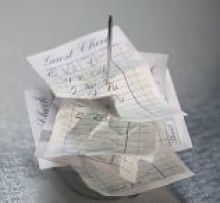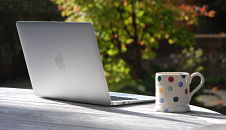 You sit down to tackle the mound of paperwork in your weekly, monthly or dare I mention annual bookkeeping ritual (click here for why this isn’t a good idea) only to discover you’re missing receipts for expenses you know you’ve incurred.
You sit down to tackle the mound of paperwork in your weekly, monthly or dare I mention annual bookkeeping ritual (click here for why this isn’t a good idea) only to discover you’re missing receipts for expenses you know you’ve incurred.
You understand that “allowable” expenses are a good thing when it comes to working out your tax and more expenses mean lower taxable profit and less tax to pay. Right? But, you’ve also heard that if you don’t have the receipt to hand, you can’t make a claim for the business expense on you self-assessment tax return.
This is true, but there are instances when other supporting evidence will suffice…..
What do HMRC say?
HMRC guidance (see here) outlines the need to keep records of all your business expenses and the types of proof you need include:
- Receipts for goods and services and
- Bank statements and cheque stubs
You don’t always need a receipt
Best practice should ALWAYS be to keep all invoices and receipts but sometimes this just isn’t possible and whether or not you need a receipt to support an expense claim really depends on the type, level and frequency of the expenditure in question.
Here are some examples to illustrate:
1 – Online subscriptions
If you’re making regular payments for online subscriptions such as Xero, Dropbox or Microsoft, as long as you can show these amounts going out of your bank account, missing a few invoices a year shouldn’t preclude you from making a claim for these costs as a business expense.
2 – One-off large purchases
 You make a large one off payment for a laptop or expensive equipment to be used in your business. Despite the evidence of physical existence and independent confirmation from a credit card or bank statement, obtaining a receipt would be recommended.
You make a large one off payment for a laptop or expensive equipment to be used in your business. Despite the evidence of physical existence and independent confirmation from a credit card or bank statement, obtaining a receipt would be recommended.
3 -Cash expenses
We all make the odd cash payment towards a business expense but how often do these receipts find themselves scrunched up in coat pockets, never to see the light or day or buried in and amongst the personal shopping receipts? What about the receipts that you recover but now so faded they are hardly legible or the parking you did last week, but then forgot to press the “receipt” button. Sound familiar?
No receipt, no claim? Not exactly. HMRC confirm that for small cash expenses it’s sometimes OK to claim for a cash receipt that can’t be substantiated. HMRC offers this guidance in the “General guide to keeping records for your tax return”
“Sometimes you may not get evidence such as a receipt for cash expenses, especially where the amounts are small. If this happens, you should make a brief note as soon as you can of the amount you spent, when you spent it and what it was for”
What happens if I am VAT registered?
The advice above is relevant for the non-VAT registered business owner. If you are VAT registered under the standard VAT scheme and want to claim VAT incurred on your expenses, then you will need to have proper VAT receipts.
How to improve recording receipts
Bookkeeping ~ Little but often
 If you deal with your paperwork in little chunks on a regular basis, you’re far more likely to pick up all the expenses you’ve incurred. The time span between spending the money and writing up your records is minimised allowing you a greater chance of remembering the smaller cash purchases.
If you deal with your paperwork in little chunks on a regular basis, you’re far more likely to pick up all the expenses you’ve incurred. The time span between spending the money and writing up your records is minimised allowing you a greater chance of remembering the smaller cash purchases.
Checking to the bank statement
Get into the routine of regularly checking receipts to your bank statement and vice versa. This reconciliation procedure will help highlight items for which you have no invoice or receipt for. Think of all the online purchases made on Amazon or Paypal payments you’ve made to other online providers – performing a bank reconciliation will prompt you to dig out the paperwork.
Expense recording apps
If you are using online accounting software such as Xero, Quickbooks or Kashflow, some of these suppliers offer a free app to record expenses on the go. I love the Xero Touch app which allows me to scan photos of my smaller parking, travel and postage receipts, record the details and then automatically log these into my accounting records.
Summary
To satisfy HMRC requirements that you have incurred a business expense keep hold of all your paperwork – receipts, credit card and bank statements. For the odd cash expense that you can’t substantiate with a receipt, keep written records with as much detail as possible. Try and get into a routine of regularly keeping on top of the paperwork and checking to your bank statement. The secret is “little but often”.
What next?
Keen to save tax and gain that extra piece of mind that comes with outsourcing your small business tax and accounts? Come on over and take a peep at how I can help you and what people say.
Not quite ready to invest in accountancy support but need some help at the sidelines? Take a look at my blog series on tax returns or sign up here for more helpful tips and inspiration.
P.S. Pass it on
I hope you’ve found this post helpful? Please consider sharing with other small business owners by using the buttons below. It would mean so much to me if you did. Thank you.
